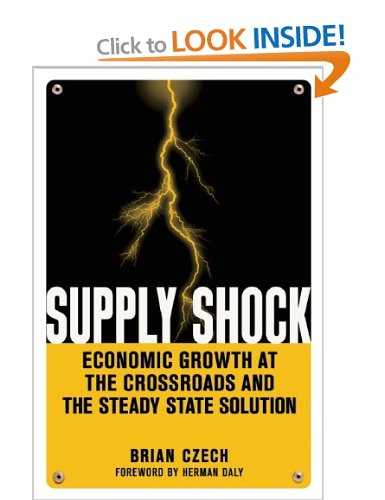I’ve just finished reading Supply Shock by Brian Czech and I’m going to give you a summary of what I’ve learned.
Basically after reading Enough is Enough by Rob Dietz and Dan O’Neill (see this post) I was desperate to get my hands on another book that would flesh out the steady state concept even more. Supply Shock wasn’t that book, unfortunately. Only the last chapter dealt with actual policies for a steady state, and they were taken straight out of Enough is Enough (with credit, I might add). But the book did have a merit of its own.
The basic point that Czech kept coming back to was that:
There is a fundamental conflict between environmental protection and economic growth.
It seems simple enough, but not when you delve a little deeper. Politicians are very fond of the win-win rhetoric that we can have our cake and eat it too: that we can stop climate change, save endangered species and all while increasing the rate of economic growth. In fact lately there’s even been talk of ‘green growth’ and ‘smart growth’. Czech warns us not to be sucked in, because both are empty words, i.e. bullshit. Green growth is still growth, and at the moment growth is bad because the global economy is too large for the planet to sustain. See ‘‘We’ve Had Enough Growth’‘ for more on this.
Czech is very keen to debunk the techno-optimist’s myth that technological progress will resolve the fundamental conflict between environmental protection and economic growth. This I thought was one of the strength’s of the book, and where I learned the most. There are 3 main reasons why technological progress isn’t the magic bullet of our dreams.
1. Billions are spent on research and development every year, by governments, industry, educational institutions and NGOs. In America it is categorized as either basic research, applied research or end-use innovation. The first two are mostly focused around extracting more natural resources more efficiently (which means more can be extracted, not less energy being used to extract the same amount), designing new products and generally making more money. Only end-use innovation is likely to be used to reduce pollution and other environmentally sensitive aims, and that will still just be a small proportion of all end-use innovations. This means that most technological research and development – at least now – is focused on economic growth, which is counter productive to environmental protection.
2. The field of physics called thermodynamics offers two limits to how much efficiency gains from technological innovation can be reached. The first is that in nature (remember that includes us!) you can never have absolute efficiency – some energy is always lost from the system as heat. The second is that you cannot get something from nothing – energy and matter are never destroyed or created, just moved around and transformed. At the moment, in the UK, 1/3 of the energy produced is lost as heat before it reaches it’s destination. That’s shockingly poor efficiency, and we can get a lot better than that, but there are limits to how efficient we can be.
3. The trophic theory of money, as Czech calls it, puts an end to the cries that we’re living in an information economy now so we don’t need as many resources. The internet is a fantastic invention, and it’s very easy to get carried away thinking we can still have economic growth if all that’s growing is pixels on a screen. But web businesses rely on a very sophisticated pyramid of other services. Accounting, marketing, graphic design, programming, animation… And then there’s the manufacturing of the actual equipment, which again relies on the manufacture of much more basic components, not to mention electricity. And the fact is, none of this would be possible without a huge amount of agricultural surplus. If there wasn’t a surplus, my hands would be on the plow, not the keyboard. The economy lies on a foundation of agriculture, then extraction, then manufacture, then services and very sophisticated services like finance and web design are right at the top – supported by everything else. We absolutely cannot have these things without the natural capital feeding the base of the pyramid.
So that’s why technology won’t be able to save us.
But that doesn’t mean it won’t help, along side other things.
I’m working on a list of policies for a steady state economy, partly from Enough is Enough and partly from other reading and my own imagination. I’ll start posting them in sections, such as Population, Progress Indicators, Food, Money, Business, Jobs, Cities, Energy and Transport.

Tegan, this was very informative. clear and concise. No technology isn’t the answer and as you pointed out research money is spent on matters not in the best interests of the earth. I believe the best solution at this time is to combine the technology we have with the behaviors of past generations
Thank you! And yes I think that is the best way. I don’t agree with trying to get back to some kind of rustic idyll that never happened, but I do agree with mixing behaviors of the past with the best modern ideas and technologies.